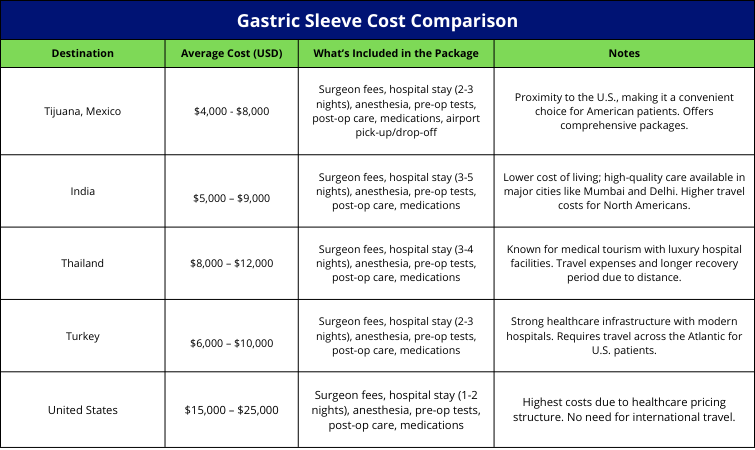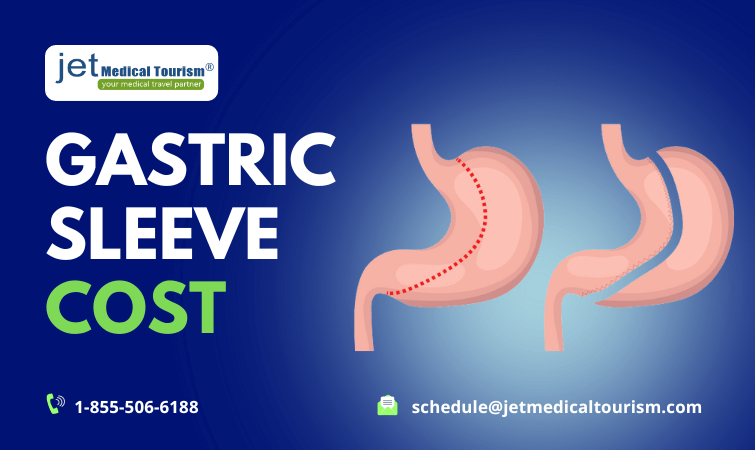Gastric Sleeve Costs: Expenses and Financing Options
Welcome to Jet Medical Tourism’s comprehensive guide on gastric sleeve cost. If you’re considering gastric sleeve surgery as a weight loss solution, it’s important to understand the expenses associated with the procedure. In this article, we will delve into various factors that influence the cost, explore average costs in different regions, discuss financing and insurance options, evaluate cost versus value, and provide tips for managing surgical expenses effectively.
Want to learn more about the factors that affect the cost of gastric sleeve? Call or email Jet Medical Tourism® today.
Factors Affecting Gastric Sleeve Cost:
To grasp the full picture of gastric sleeve cost, it’s essential to consider the following factors:
Geographic Location and Medical Tourism:
Geographic location and medical tourism are crucial factors that affect the cost of gastric sleeve surgery. The cost of the procedure can vary significantly based on the country or region where it is performed. For instance, countries like Mexico, Thailand, and India are popular medical tourism destinations known for offering more affordable gastric sleeve surgeries compared to Western countries.
- Factors influencing these cost differences include variations in healthcare infrastructure, labor costs, and currency exchange rates.
- Conducting a thorough comparison of costs in different countries or regions can help individuals identify potential cost savings through medical tourism while ensuring the quality and safety of the procedure.
Surgical Facility and Hospital Fees:
The choice of surgical facility and hospital can significantly impact the cost of gastric sleeve surgery. Different facilities may have varying fee structures based on factors such as their reputation, location, and amenities provided. High-end hospitals and specialized bariatric centers often charge higher fees due to their advanced equipment and experienced medical staff.
- In contrast, smaller surgical facilities may offer more affordable options without compromising on quality.
- Understanding the impact of facility choice on the overall cost of gastric sleeve surgery can help individuals make informed decisions that align with their budget and desired level of care.
Surgeon’s Experience and Expertise:
The qualifications and experience of the surgeon can significantly impact the cost of gastric sleeve surgery. Surgeons with extensive experience and expertise in bariatric procedures often command higher fees due to their specialized training and successful track records. Factors such as their board certifications, memberships in professional associations, and reputation in the field can influence pricing.
- Choosing a surgeon with a strong background in gastric sleeve surgery and a proven track record of successful outcomes may come at a higher cost but can increase the likelihood of a safe and successful procedure.
- When considering gastric sleeve surgery, it is important to factor in the surgeon’s qualifications and expertise as it can directly impact the pricing and overall quality of care.
Pre-operative Evaluations and Consultations:
Factors that can influence the cost of gastric sleeve surgery include pre-operative evaluations and consultations, which encompass associated expenses for medical tests and consultations. These evaluations are essential to assess a patient’s health and determine their eligibility for the surgery. The specific medical tests and consultations required, such as blood work, imaging studies, nutritional counseling, psychological evaluations, and consultations with the surgeon and other healthcare professionals, can vary in cost.
- The complexity of the patient’s medical history and the presence of additional health conditions may also impact the overall expenses.
- Considering these factors is crucial when budgeting for gastric sleeve surgery, ensuring individuals are prepared for the necessary pre-operative evaluations and consultations.
Anesthesia and Operating Room Expenses:
Anesthesia and operating room expenses are significant factors that affect the cost of gastric sleeve surgery. The administration of anesthesia by an anesthesiologist or nurse anesthetist is a crucial part of the procedure, ensuring patient comfort and safety during the surgery. The cost of anesthesia can vary depending on the type of anesthesia used and the duration of the surgery.
- Additionally, the use of the operating room facilities, including equipment, supplies, and staff, contributes to the overall expenses.
- Factors such as the location and reputation of the surgical facility can also influence the operating room expenses.
- Understanding these factors helps individuals consider the comprehensive costs associated with gastric sleeve surgery and make informed decisions about their healthcare investment.
Post-operative Care and Follow-up Visits:
Post-operative care and follow-up visits are important factors that can affect the cost of gastric sleeve surgery. After the surgery, patients require comprehensive post-operative care, including medication, monitoring, and regular check-ups to ensure proper healing and adjustment to the new gastric sleeve. These expenses may include the cost of medications, dietary supplements, and follow-up appointments with the surgeon and other healthcare professionals.
- The number and frequency of follow-up visits can vary depending on individual needs and the surgeon’s recommendations.
- It’s important to consider these post-operative care and follow-up visit expenses when budgeting for gastric sleeve surgery to ensure a smooth recovery and long-term success.
Additional Costs:
In addition to the primary costs of gastric sleeve surgery, there are various additional factors that can impact the overall cost. These include potential expenses related to medications, supplements, and other miscellaneous factors. Patients may need to purchase prescription medications, nutritional supplements, and vitamins to support their recovery and long-term health after the surgery.
- Additionally, there might be costs associated with laboratory tests, pre-operative and post-operative consultations, and supportive therapies.
- It’s important to consider these additional costs when budgeting for gastric sleeve surgery to ensure a comprehensive understanding of the financial commitment involved.
- By accounting for these potential expenses, individuals can make informed decisions and plan accordingly for their weight loss journey.
Gastric Sleeve vs The Cost of Other Procedures
Jet Medical Tourism provides alternative bariatric procedures for individuals who may not be suitable candidates for sleeve gastrectomy or have unique requirements. Let’s examine the cost comparison of two distinct surgeries performed at surgery centers in Tijuana, Mexico and Nuevo Laredo, Mexico.
Gastric Bypass Surgery
Jet Medical Tourism offers gastric bypass surgery at a cost of $5,595. This procedure is more intricate compared to gastric sleeve surgery but could be an ideal choice for individuals aiming to achieve specific health objectives.
Mini Gastric Bypass Surgery
At Jet Medical Tourism, the cost for mini gastric bypass surgery is $5,595. While this procedure shares similarities with a traditional gastric bypass, it is still a more complex surgery compared to gastric sleeve.
Learn more about other weight loss surgery cost.
Cost of Gastric Sleeve Procedure in Different Regions:
To provide a global perspective, let’s examine the average costs of gastric sleeve surgery in various regions:
United States: In the United States, the average cost of gastric sleeve surgery typically ranges between $15,000 and $30,000. However, it’s important to note that these prices can vary depending on factors such as the geographical location, surgeon’s experience, hospital or surgical facility fees, pre-operative evaluations, anesthesia costs, and post-operative care. Costs may also vary from state to state, with certain areas having higher prices due to factors like a higher cost of living.
- Additionally, it’s essential to consider that the total cost of gastric sleeve may include fees for consultations, laboratory tests, and follow-up appointments.
- Understanding the average costs in the United States is crucial for individuals considering gastric sleeve surgery and can help with financial planning and exploring potential medical financing options or insurance coverage.
Mexico: In Mexico, gastric sleeve surgery is often more affordable compared to the United States and other countries. The average cost of gastric sleeve surgery in Mexico ranges from $4,000 to $8,000. The lower costs can be attributed to factors such as lower overhead expenses, a favorable exchange rate, and the presence of medical tourism facilities that cater specifically to international patients.
- Despite the lower costs, it’s important to note that the quality of care and medical expertise in Mexico’s accredited hospitals and clinics remain high, attracting individuals seeking cost-effective options for their weight loss journey.
- It is advisable to thoroughly research and choose reputable facilities and experienced surgeons to ensure a safe and successful gastric sleeve procedure.
Europe: In Europe, the average costs of gastric sleeve surgery can vary depending on the specific country and healthcare system. On average, gastric sleeve surgery in Europe ranges from €8,000 to €15,000. Factors such as the country’s cost of living, medical infrastructure, and the surgeon’s expertise contribute to the overall pricing.
- Countries in Western Europe, such as Germany, France, and the United Kingdom, tend to have higher costs compared to Eastern European countries.
- It’s important to consider that these average costs may not include additional expenses such as pre-operative evaluations, post-operative care, or any required follow-up visits.
- Patients considering gastric sleeve surgery in Europe should research and consult with reputable clinics or hospitals to gain a clearer understanding of the specific costs and services provided.
Asia: In Asia, the average costs of gastric sleeve surgery can vary significantly across different countries. On average, gastric sleeve surgery in Asia ranges from $5,000 to $12,000. Countries such as India, Thailand, and Malaysia are known for offering more affordable options compared to Western countries. Factors influencing the costs include the country’s cost of living, healthcare infrastructure, and the expertise of surgeons.
- It’s important to consider that the lower costs in Asia do not compromise the quality of medical care, as many hospitals and clinics maintain high standards and offer state-of-the-art facilities.
- Patients considering gastric sleeve surgery in Asia should carefully research and select reputable providers to ensure a safe and successful procedure.
- Additionally, it is advisable to consider additional expenses such as travel, accommodation, and post-operative care when evaluating the overall cost.
Here’s a cost comparison for gastric sleeve surgery in Tijuana versus other countries:

Key Points:
- Tijuana, Mexico: Offers one of the most affordable options with comprehensive packages that cover all essential aspects of the surgery and aftercare.
- India: Slightly more expensive than Tijuana, with top-tier medical facilities available, though travel costs may be higher.
- Thailand: Known for high-quality healthcare and luxury medical tourism experiences but comes with a higher price tag and long-distance travel.
- Turkey: Provides a good balance of cost and quality, though the travel distance might be a concern for some patients.
- United States: Significantly higher cost with similar levels of care, but no need for international travel.
It’s important to note that the costs mentioned are approximate averages, and individual cases may vary based on specific circumstances, medical requirements, and additional services provided. It’s recommended to thoroughly research potential providers, consider their reputation, success rates, and patient reviews, while also assessing overall value for money and the level of care provided. Consulting with healthcare professionals and understanding financing options or insurance coverage can help individuals make informed decisions regarding gastric sleeve surgery costs worldwide.
Why is Gastric Sleeve in Tijuana, Mexico affordable?
Mexico has emerged as a leading destination for medical tourism, particularly for procedures like gastric sleeve surgery. This affordability is primarily due to several interconnected factors:
- Economic Disparity: The significant economic disparity between Mexico and many developed countries results in lower operational costs for healthcare facilities. This includes lower salaries for medical professionals, administrative staff, and support personnel.
- Currency Exchange Rates: A favorable exchange rate between the US dollar and the Mexican peso often provides substantial savings for international patients. This means that procedures that might be prohibitively expensive in the US can be significantly more affordable in Mexico.
- Competitive Market: The growing popularity of medical tourism in Mexico has fostered a competitive environment among healthcare providers. This competition drives down prices and encourages clinics and hospitals to offer competitive packages to attract patients.
- Lower Overhead Costs: Compared to many Western countries, Mexico has lower overhead costs for healthcare facilities, including rent, utilities, and equipment. These savings are often passed on to patients in the form of lower procedure costs.
What Is Included in the Gastric Sleeve Surgery Cost
The all-inclusive cost of a gastric sleeve surgery (VSG) in Mexico typically encompasses the following components:
- Pre-operative Assessments: Comprehensive medical evaluations, including blood tests, consultations with specialists (anesthesiologist, nutritionist, psychologist), and diagnostic procedures.
- Surgical Procedure: The actual gastric sleeve surgery performed by a qualified bariatric surgeon, including operating room fees and surgical supplies.
- Anesthesia: The costs associated with anesthesia administration and monitoring during the surgery.
- Hospital Stay: Accommodation in a hospital room for the duration of the postoperative recovery period.
- Post-operative Care: Immediate post-operative care, including medication, wound care, and initial dietary guidance.
- Follow-up Consultations: Scheduled follow-up appointments with the surgeon to monitor healing progress and address any concerns.
It’s crucial to inquire about any additional charges that might apply, such as medication costs after discharge, diagnostic tests not covered by the package, or accommodations for accompanying persons.
Financing and Insurance Options for Cost of Gastric Sleeve:
Navigating the financial aspect of gastric sleeve surgery can be challenging. Here, we discuss various options available for financing the procedure:
Health Insurance Coverage and Criteria:
Understanding insurance policies and coverage requirements. Health insurance coverage for gastric sleeve surgery varies depending on the insurance provider and policy terms. Understanding the insurance policies and coverage requirements is crucial for individuals considering the procedure. Many insurance companies cover bariatric surgeries like gastric sleeve if specific criteria are met, such as a documented history of failed attempts at weight loss, a certain body mass index (BMI) threshold, and associated health conditions. Prior authorization, documentation of medical necessity, and pre-approval from the insurance provider may be required. It’s important to carefully review the policy and communicate with the insurance company to understand the coverage limitations, deductibles, co-pays, and any out-of-pocket expenses. Consulting with the insurance provider and healthcare professionals can help navigate the insurance process and maximize coverage for gastric sleeve surgery.
Financing Plans and Medical Loans:
Exploring specialized medial financing options for bariatric surgeries. For individuals who are unable to pay for gastric sleeve surgery upfront or do not have health insurance coverage, exploring financing plans and medical loans can provide an alternative solution. Many healthcare financing companies and specialized lenders offer financing options specifically tailored to bariatric surgeries. These financing plans typically allow patients to spread the cost of the procedure over a designated period, making it more manageable to afford. Interest rates, repayment terms, and eligibility criteria may vary among lenders, so it’s important to compare options and choose a plan that suits individual financial circumstances. Additionally, some clinics or hospitals may offer in-house financing options or partnerships with financing companies, providing further convenience and flexibility. Exploring these financing options can make gastric sleeve surgery more accessible and affordable for individuals seeking weight loss solutions.
Employer-Sponsored Health Benefits:
Investigating potential assistance through employee benefits. When considering gastric sleeve surgery, individuals should investigate potential assistance through their employer-sponsored health benefits. Some employers offer comprehensive healthcare packages that include coverage for bariatric surgeries. It is advisable to review the employee benefits handbook or consult with the human resources department to understand the coverage details and eligibility criteria. Employers may require documentation of medical necessity, such as a certain BMI threshold or documented failed attempts at weight loss. Understanding the extent of coverage, deductibles, co-pays, and any restrictions on in-network providers is crucial. Taking advantage of employer-sponsored health benefits can significantly reduce out-of-pocket expenses and make gastric sleeve surgery more affordable. It’s important to proactively communicate with the employer and insurance provider to navigate the process and maximize the benefits available.
Government Assistance Programs:
Discussing potential government programs and eligibility criteria. Government assistance programs can provide a valuable avenue for individuals seeking financial support for gastric sleeve surgery. Depending on the country or region, there may be specific programs or initiatives aimed at promoting access to bariatric surgeries for those in need. These programs typically have eligibility criteria based on factors such as income, medical necessity, and associated health conditions. For example, in some countries, government healthcare programs or Medicaid may cover bariatric surgeries under certain circumstances. It is essential to research and understand the specific government assistance programs available in the respective region and the requirements for qualification. Consulting with healthcare professionals and reaching out to government agencies or social services can provide valuable guidance in accessing these programs and exploring the potential financial assistance they offer for gastric sleeve surgery.
Gastric Sleeve Cost vs. Value: Considerations for Decision-making:
When evaluating the cost of gastric sleeve surgery, it’s crucial to consider the value and long-term benefits. This section covers the following aspects:
Long-Term Health Improvements:
Assessing the impact on weight loss and associated health conditions. Gastric sleeve surgery offers significant long-term health improvements for individuals struggling with obesity and related health conditions. One of the primary benefits is substantial weight loss. Studies have shown that patients can achieve an average weight loss of 60-70% of their excess weight within the first year after the surgery. This weight loss can lead to improvements in various obesity-related conditions such as type 2 diabetes, high blood pressure, sleep apnea, and joint pain. Additionally, gastric sleeve surgery can have a positive impact on mental health, body image, and overall quality of life. It’s important to note that long-term success depends on adopting healthy lifestyle changes, including a balanced diet and regular exercise. Regular follow-up appointments and ongoing support from healthcare professionals play a crucial role in monitoring progress, addressing any concerns, and ensuring sustained long-term health improvements.
Potential Cost Savings in Medical Expenses:
Understanding the financial benefits of improved health. Gastric sleeve surgery not only provides long-term health improvements but also offers potential cost savings in medical expenses. As individuals achieve significant weight loss and improve their overall health, they may experience a reduction in the need for medications and treatments related to obesity-related conditions. Conditions such as type 2 diabetes, high blood pressure, and sleep apnea often require ongoing medical management, which can be costly. By successfully addressing these conditions through gastric sleeve surgery, individuals may reduce or eliminate the need for certain medications, doctor visits, and hospitalizations, resulting in substantial cost savings over time. Moreover, the prevention or improvement of obesity-related complications, such as cardiovascular diseases and joint problems, can lead to fewer medical interventions and associated expenses. It’s important to consider the long-term financial benefits of improved health when evaluating the cost-effectiveness of gastric sleeve surgery.
Quality of Services and Patient Experiences:
Weighing the costs against the level of care and patient satisfaction. When considering the costs of gastric sleeve surgery, it is essential to weigh them against the quality of services and patient experiences. While cost is an important factor, it should not be the sole determining factor when choosing a healthcare provider. It’s crucial to research and select reputable hospitals or clinics that offer a high level of care and have experienced bariatric surgeons.
Reading patient reviews and testimonials can provide insights into the overall patient satisfaction and the quality of services provided. The level of pre-operative evaluations, surgical techniques, post-operative care, and ongoing support should be considered in evaluating the value for money. Opting for a facility that prioritizes patient safety, provides personalized care, and offers comprehensive support throughout the entire process can greatly enhance the overall experience and increase the chances of successful outcomes. Ultimately, striking a balance between the costs and the quality of services is crucial in making an informed decision regarding gastric sleeve surgery.
Financial Investment and Improved Quality of Life:
Evaluating the overall return on investment. Considering gastric sleeve surgery as a financial investment can be worthwhile when evaluating the improved quality of life it can bring. While the upfront costs of the procedure may seem significant, the long-term benefits and potential cost savings make it a valuable investment. Gastric sleeve surgery can lead to substantial weight loss, improving overall health and reducing the risk of obesity-related complications. This, in turn, can result in reduced medical expenses associated with conditions like diabetes, hypertension, and sleep apnea. Additionally, the positive impact on mental well-being, self-confidence, and improved quality of life are invaluable returns on investment. When making the decision to undergo gastric sleeve surgery, it is important to consider not only the financial aspect but also the significant positive impact it can have on overall health and well-being in the long run.
Tips for Managing Gastric Sleeve Surgery Costs:
Managing surgical expenses effectively is vital. Here are some practical tips to help you navigate the financial aspects of gastric sleeve surgery:
Research and Compare Multiple Providers:
Assessing different surgery providers and their pricing structures for gastric sleeve is crucial to research and can help you find the best fit for your needs. Start by exploring reputable hospitals, clinics, and bariatric centers that offer gastric sleeve procedures. Assess their expertise, reputation, and patient reviews to gauge the quality of their services. Additionally, carefully examine their pricing structures and compare costs, taking into account factors like surgeon’s fees, hospital or facility charges, pre and post-operative care, and any additional services included in the package. By researching and comparing multiple providers, you can make an informed decision based on both the quality of care and the pricing structures, ensuring the best possible outcome for your gastric sleeve surgery journey.
Explore Medical Tourism Options:
Considering the advantages and potential gastric sleeve cost savings by exploring medical tourism options can offer significant advantages and potential cost savings. Medical tourism allows individuals to seek healthcare services, including gastric sleeve surgery, in other countries known for their expertise and affordability. By traveling to popular medical tourism destinations, such as Mexico, Thailand, or India, individuals can access high-quality healthcare facilities and experienced bariatric surgeons at a fraction of the cost compared to their home countries. Medical tourism packages often include comprehensive services like pre-operative evaluations, surgical procedures, post-operative care, and even accommodation and transportation. Conducting thorough research on reputable medical tourism providers like Jet Medical Tourism, reading patient testimonials, and comparing costs can help you make an informed decision, balancing the advantages of medical tourism, such as quality healthcare and potential cost savings, for your gastric sleeve surgery needs.
Utilizing Flexible Payment Plans:
Understanding and utilizing payment plans offered by providers can help make the procedure more financially manageable. Many healthcare providers offer payment plans specifically designed to accommodate patients’ needs. By opting for a payment plan, individuals can spread the cost of gastric sleeve surgery over a designated period, making it easier to fit within their budget. These plans often come with low or no interest rates, allowing patients to pay in affordable monthly installments. Understanding the terms and conditions of these payment plans, including the duration, interest rates, and any associated fees, is crucial when making a decision. By utilizing flexible payment plans, individuals can undergo gastric sleeve surgery without incurring a significant financial burden upfront, making the transformative weight loss procedure more accessible and achievable.
Communicating with Insurance Providers:
Advocating for coverage options and understanding the claims process. When considering gastric sleeve surgery, effective communication with insurance providers is essential to advocate for coverage options and navigate the claims process. Start by reviewing your insurance policy to understand the coverage criteria for bariatric procedures. Document any medical necessity requirements, such as a specific BMI threshold or associated health conditions. Reach out to your insurance provider and engage in open and clear communication to discuss the coverage options available and any necessary documentation needed for pre-approval.
Keep thorough records of conversations, including the names of representatives and dates of communication. Understanding the claims process, including deductibles, co-pays, and out-of-pocket expenses, is crucial to plan your financial obligations. By effectively communicating with your insurance provider and advocating for coverage options, you can increase the chances of obtaining insurance coverage for your gastric sleeve surgery and alleviate potential financial burdens.
Maximizing Tax Benefits and Deductions:
Exploring potential tax benefits associated with medical expenses. Maximizing tax benefits and deductions related to gastric sleeve costs can help offset the financial burden of the procedure. In some cases, gastric sleeve surgery may qualify as a deductible medical expense under certain tax laws. To take advantage of these benefits, it is crucial to consult with a tax professional or review the specific tax regulations in your country. Keep detailed records of all medical expenses related to the surgery, including hospital bills, surgeon’s fees, pre and post-operative care, and any prescribed medications. These expenses may be eligible for deduction if they exceed a certain percentage of your adjusted gross income. By exploring and understanding the potential tax benefits associated with gastric sleeve costs, individuals can optimize their financial situation and reduce the overall cost of the procedure.
Understanding the Cost Factors, Financing Options for Gastric Sleeve Surgery
Understanding the cost factors and financing options for gastric sleeve surgery is crucial. By evaluating the average surgery costs domestically and internationally, individuals can make informed decisions about their healthcare investment. Exploring options like health insurance coverage, medical loans, employer benefits, and government assistance can provide financial relief and make the surgery more accessible. Additionally, considering the quality of services, patient experiences, and long-term health improvements associated with gastric sleeve surgery justifies the investment. Weighing the costs, financing options, and potential returns on investment allows individuals to embark on their gastric sleeve journey confidently, knowing they have explored the best financial strategies for their weight loss and improved health goals.
Gastric Sleeve Surgery: Quality Care, Competitive Cost
Achieve Your Weight Loss Goals Without Financial Stress!
We believe that everyone deserves access to high-quality weight loss surgery. Contact us today to request a personalized cost estimate and explore your options.




